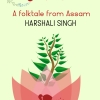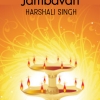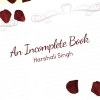
‘Do you think when terrible things happen, it leaves a stain on the place where they occur?’ she asks me, touching my stone-cold heart, warming it with her cheek. ‘Why do I feel it has left one on me?’ she questions.
I am not at liberty to disclose the cause of her pain, even to her. The dreams that haunt her, the otherness she feels, all stem from her past. A past she has misplaced, suppressed. I wish I could hold her, wrap my arms around her, a gesture she rarely allows. I yearn for my inanimate self to. . .only for a moment, become alive. Not because I want to experience touch, but so I can give her a moment of respite from the nightmares that haunt her on some nights. She is Charu, the third daughter of the large Sharma family that inhabits me now. I am Anwar Haveli—the Haveli with hundred doors.
A solemn baby, she was born with eyes too old in her infant face. I knew then that she was an old soul who had chosen to be reborn. She was special. The quietest of the siblings, she held my stone-heart in her palms since she lost her sight at nine years of age. It was sudden. The devastation her parents underwent was nothing compared to what the little girl had to come to terms with. Her confusion, helplessness, and anguish on sensing her parents’ inability to handle the irreversible change in her circumstances were agonising to watch. They tried to do the best they could, but sometimes our best is not enough.
I have weathered the storms of progress in this old colony of Naugraha. In the last 150 years, I have seen old Delhi’s lanes grow narrower; the outcrops and illegal constructions almost choke the streets. Once, horse carriages rode regally here. Large water fountains stood resplendent in every courtyard the trickling water, perfumed with ittar, attracting a hoard of butterflies fluttering around the flowers. Art and culture were celebrated through the lively mehfils and mushairas. Such happy days they were, yet so short-lived. We used to be nine Havelis once. Soon the loneliness, the ignominy of the lives that surrounded me, usurped me. The new era shook me to my very foundations and obliterated many of my counterparts. Slowly, the families moved away, but the nostalgia lingered, haunting the sprawling mansions, reminding us of the changing dynamics of time.
The grandeur faded, and so did we. The sepia hue took over all the facets of our existence and, like the gauzy film of dust that lies unmoving, we watched silently as the world continued its rotation. I wonder what would have become of me had the Sharma family not moved in. The head of the Sharma family, Arun, came as a young boy brimming with promise and ambition. His father’s heavy-handedness and Arun’s unfulfilled dreams made him into the man he is today—passive and resigned.
His half-brother Varun also grew up in my rooms. Two brothers separated by warring mothers.
Arun’s wife, the devout Uma, who walks with a limp due to a past illness, joined this dysfunctional family. Full of gumption and emotional strength, she resolved to find a peaceful solution to the constant unpleasantness.
She reinstated Arun’s mother as the matriarch and set up Varun’s mother and her son in a modest house in another part of the city. This small victory instituted by handing over her gold and appealing to the lady’s vanity, Uma was able to weed out the chaos from their lives.
It was my Uma who shook away my malaise. Airing out my shuttered rooms, she let in the sun and restored my pride with a quick coat of paint. The glass panes shone again, and the lattice jalis were scrubbed clean of cobwebs. The gardens flourished, the fountain gurgled, and I felt revived. . .rescued.
The children came within a few years of each other. Aruna, the eldest, then Bhavya and, finally, Charu, my sweet sunflower. I had thought they had given up having more children after Charu, but Uma had always wanted a son. Maybe, it was to save her crumbling marriage that she decided to try one more time. This time she was successful in bearing a male child, the heir.
The pride of this achievement shone on Uma’s face for many years. Women crave to give their families a male child. And so, Dheeraj became the heir apparent, set to inherit the saree shop his father had been gifted.
The children grew up together, loved and happy. The parents masked their personal struggles as best as possible and tried to present a united front.
After a few years, Arun mollified his panicked wife when they found out the cause of her morning sickness was not one child but three. Etti came first; a second later, it was Fanny, and then came Gina. And, so, the already big family became enormous.
Despite the love that surrounds me, it was only when Charu started calling me by my name, Anwar, did I truly become a part of their life. How easily she made me tangible. Maybe I am biased, but I am allowed to play favourites at my age, I suppose. And, she is that, the most beloved out of the seven children. When Charu was nine years old, she told her mother that she could smell the grass, feel the hot sun, and sense her mother’s fear, but could not see anything. The doctors confirmed that she had suffered from a condition as a result of her untreated eye problems. It had caused her to go blind.
It was an arrow into the heart of the family’s happiness. Uma took the news to heart, blaming herself for delaying Charu’s treatment. Arun fell into a strange melancholy and became estranged from his wife and children—a chasm that kept growing.
Uma was caught between a mother’s guilt and the constant problem of not knowing what to do to help her daughter who was disabled and would always be treated as a lesser being in this world just as she had been regarded. Her fear of repeating her own mother’s mistakes kept her at arm’s length from her daughter.
My Uma staggered under the weight of being strong and buckled under the pressure of taking care of her seven children and me. Suresh, Arun’s best friend, helped with Charu and her special needs like a surrogate father.
The little girl became more subdued as the days passed. She had to unlearn everything, acquire new skills to survive. Joy seemed to drip out of her one day at a time. Uma had always been fearful of the heightened intuition that was a part of Charu’s personality. She found it growing stronger when Charu lost her vision. After trying to manage on her own for almost two years, Uma decided to send Charu to her mother in Surat to be home-schooled.
Though she knew her mother was stiff and cold, she also knew if someone could give Charu the skills to stand tall in this challenging world, it was her.
Charu was heartbroken when the news was shared with her. I heard her weeping the night before she was to leave, repeatedly asking her sisters what she had done wrong.
As time passed, I saw Charu change. The bond had broken. She blamed her mother for not wanting her enough. The silences grew sharper, the distance between them longer. The loss of her vision augmented her ability to sense people’s feelings and thoughts, isolating her further, for no one wants to be read like a book. But, this ability also allowed her to find her calling.
Oh, Charu has had a difficult life. Every bruise she carries inside and out is a consequence of my presence in her life. She still suffers and fears being abandoned and displaced because no one addresses the hurt that still throbs inside her. She dreams again, not the restful dreams of the future but nightmares that lead to a reality that is best left buried.
This is Charu’s story. . .
About the Author







Comments